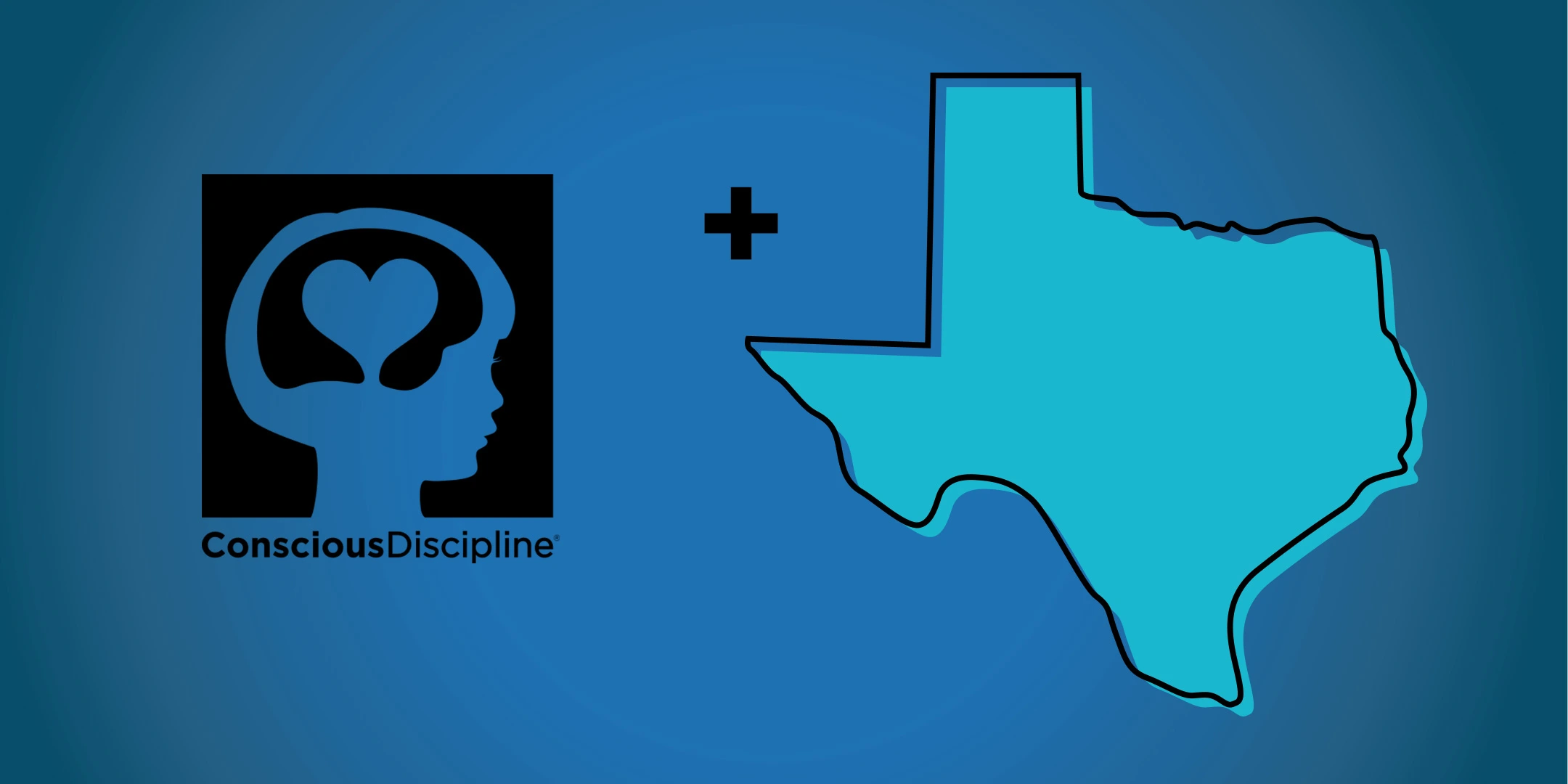For over 25+ years, Conscious Discipline has fostered a fundamental shift in thinking that empowers adults and children to be the change they want to see in the world, all over the world. It’s this transformative approach to social development, emotional literacy and behavior management that has a long history of revolutionizing educational systems in Texas.
By fostering a culture of connection, safety, and problem-solving, Conscious Discipline aligns seamlessly with the mental health and wellness strand of the Texas Essential Knowledge and Skills (TEKS) providing an environment where students and teachers alike can thrive.
Let’s explore how implementing Conscious Discipline can positively impact Texas schools, its alignment with TEKS, its benefits for students, educators, school leaders and the broader school community, and where you can look for funding opportunities to support its implementation.
Who is Conscious Discipline?
Conscious Discipline is a trauma-responsive, brain-based practice designed to enhance social development, emotional literacy, discipline and behavioral management built on these components:
- The Conscious Discipline Brain State Model: This model helps educators understand how brain states influence behavior and learning: all behavior is communication. The Brain States help us determine how to respond.
- Seven Powers for Conscious Adults: These powers equip educators with tools to regulate their emotions and model healthy behaviors for those in their care.
- Creating the School Family: This concept fosters a sense of belonging and connection among students and staff. Fostering a sense of safety and belonging is the only way true learning can take place.
- Seven Skills of Discipline: These skills provide actionable strategies for teaching self-regulation, conflict resolution, and problem-solving.
By integrating these elements into districts, schools, classrooms and communities, Conscious Discipline creates a positive climate, culture and supportive environment where students and educators alike can face the challenges of the modern educational landscape with composure and confidence.
Get in Alignment: Conscious Discipline and TEKS
The Texas Essential Knowledge and Skills (TEKS) framework places emphasis on the importance of mental health and wellness in education. The mental health and wellness strand focuses on developing students’ emotional intelligence, resilience, and interpersonal skills.
According to the mental health and wellness strand of TEKS, students are expected to:
- Identify their own feelings and emotions
- Discuss and explain how emotions can interrupt thinking and the self-management process
- Describe and practice calming and self-management strategies
- Describe ways in which peers and families can work together to build healthy relationships
- Describe ways to build and maintain friendships
- Identify ways to respectfully communicate verbally and nonverbally
- Identify feelings and emotions expressed by others
- Identify and practice ways to solve conflicts with friends and peers.
- Discuss ways to be kind to self and how to identify areas for growth
- Explain the importance of goal setting and task completion.
- Discuss and demonstrate how to treat peers with different learning needs with dignity and respect
- Identify situations that can create positive stress and positive emotions
- Discuss the signs and symptoms associated with negative stress such as loss or grief
Conscious Discipline aligns with these objectives in several ways:
- Emotional Regulation: Conscious Discipline teaches students and educators how to regulate themselves in order to handle their emotions in times of upset. This approach directly aligns with TEKS’ emphasis on emotional intelligence and self-awareness.
- Resilience Building: By fostering a culture of safety and connection, Conscious Discipline encourages the development of resilience in adults and students through training, coaching, and leadership program opportunities.
- Relationship Building: The creation of the School Family promotes collaboration, empathy, and communication, which are integral to the TEKS mental health and wellness strand.
- Problem-Solving: Conscious Discipline equips students with conflict resolution and problem-solving skills, directly supporting TEKS’ goals for social-emotional development.
Positive Impact of Conscious Discipline Solutions on Texas Educational Systems
Improved Student Outcomes
Conscious Discipline enhances students’ social development, emotional literacy and executive functioning skills, leading to better academic performance and overall well-being. Research has shown that students in classrooms implementing Conscious Discipline demonstrate improved executive functioning, which is crucial for academic readiness.
Increased Teacher Retention
Educators trained in Conscious Discipline report higher levels of job satisfaction and reduced burnout. The approach empowers teachers to manage their own emotions and create a positive classroom environment.
Stronger School Communities
The School Family concept fosters a sense of belonging and unity, creating a supportive school culture. This approach reduces behavioral issues and promotes collaboration among students and staff.
Trauma-Responsive Practices
Conscious Discipline’s trauma-responsive approach is particularly beneficial for students who have experienced adverse childhood experiences. By addressing the root causes of behavioral issues, this methodology supports students’ mental health and academic success.
Funding Opportunities for Conscious Discipline Implementation in Texas
Implementing Conscious Discipline requires resources for training, materials, and ongoing support. Fortunately, there are several funding opportunities available to Texas schools:
- Title I Funding: Title I, Part A of the Elementary and Secondary Education Act (ESEA) provides funding to schools with high percentages of children from low-income families. These funds can be allocated to support social-emotional learning (SEL) initiatives, including Conscious Discipline.
- Title II Funding: Title II, Part A of the ESEA focuses on improving teacher and administrator quality. This funding can be used for professional development in SEL practices.
- Title IV Funding: Title IV, Part A of the ESEA, also known as the Student Support and Academic Enrichment (SSAE) grant, provides flexible funding to improve students’ academic achievement. Schools can use these funds to implement SEL programs like Conscious Discipline.
- NoVo Foundation Grants: The NoVo Foundation offers grants for SEL initiatives, including Conscious Discipline. These grants support projects that promote belonging, well-being, and trauma-informed practices.
- TEA Grant Opportunities: Many local and state organizations provide funding for programs dedicated to students social development, resilience, regulation and behavior management. Schools can explore partnerships with community organizations and businesses to secure additional resources.
- Texas Health and Human Services Educational Grants
Implementation Strategies
Professional Development
Effective implementation of Conscious Discipline requires comprehensive training for educators. Professional development programs provide teachers with the tools and knowledge needed to integrate the methodology into their classrooms. Conscious Discipline offers a wide range of professional development opportunities both onsite and virtually to suit the individual needs of a school or district. Choose from our live events, virtual workshops, eCourses, eLearning, books for book studies or PLC’s and more.
District Success
For maximum impact, Conscious Discipline should be adopted at the district level. This ensures consistency in practices and fosters a unified approach to social-emotional learning. We want to help you create a district-wide implementation plan that’s right for you. We’ll even do it for free.
Training and Coaching
Our Conscious Discipline training and coaching offerings are more than traditional professional development. They provide customized and expert support in an established partnership between Certified Instructors and teachers and leaders in education to deepen implementation.
Conscious Discipline offers a powerful framework for transforming educational systems in Texas. By aligning with the mental health and wellness strand of TEKS, our approach enhances teacher well-being, improves academic outcomes and fosters stronger communities. We continue to confidently navigate the landscape of funding with you, so much so as to offer our assistance with grant proposals. If you’d like more information on how training and coaching can impact your school or district, contact us here.
With our partnership, Texas schools can continue to create a brighter future for students and educators alike.
Upcoming Events
- Conscious Discipline Institute in Phoenix, AZ: Summer Educator Event
- Anger and Rage: Planning Our Response: Education Event in Orlando, FL
- Conscious Discipline Institute: Birth to Five Years: Summer Educator Event in Chicago, IL
- Conscious Discipline Institute in Louisville, KY: Summer Educator Event
- Centering the Adult Brain: Coaching Yourself So You Can Coach Others: Education Event in Edmond, OK
- Conscious Discipline Advanced Institute in Navasota, TX: Advanced Educator Event




